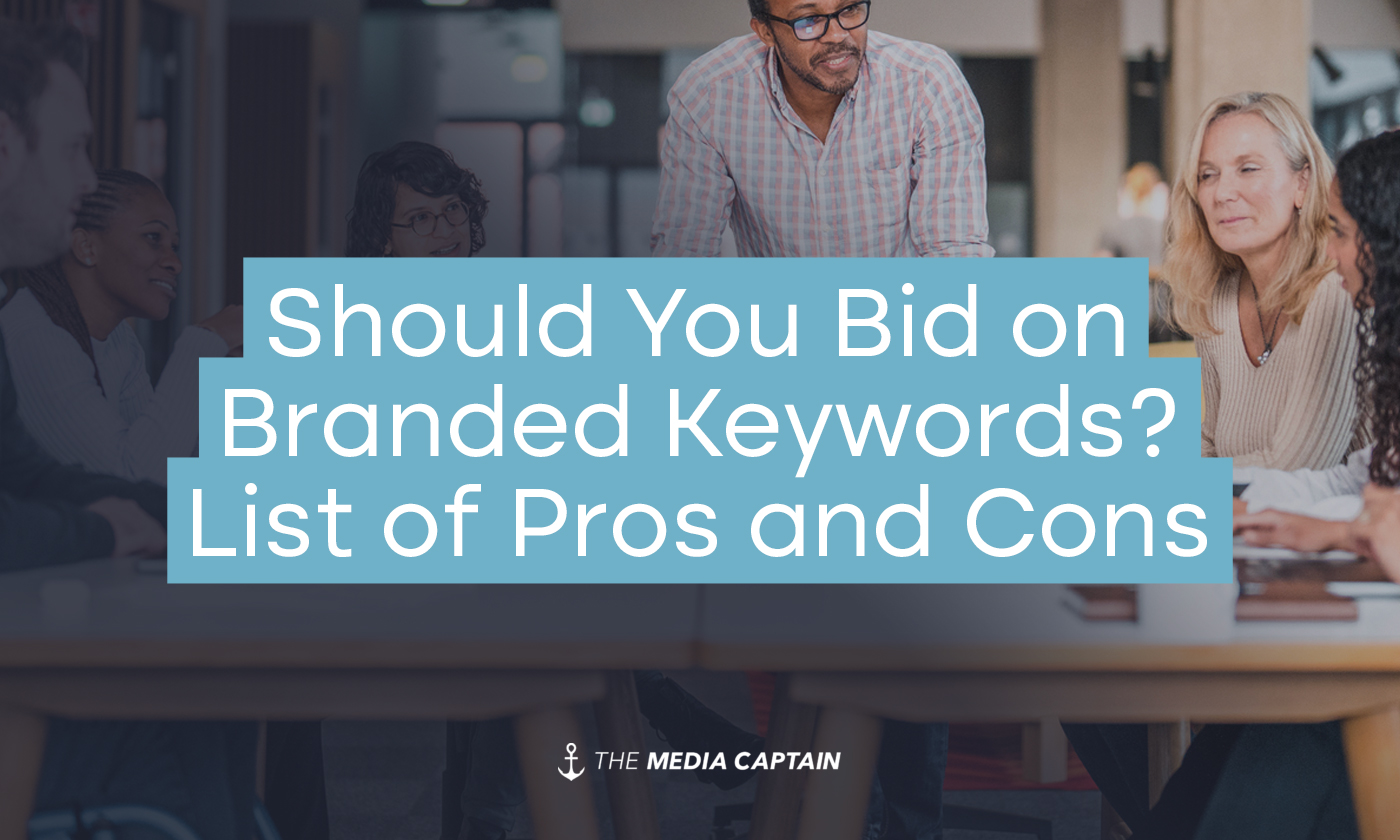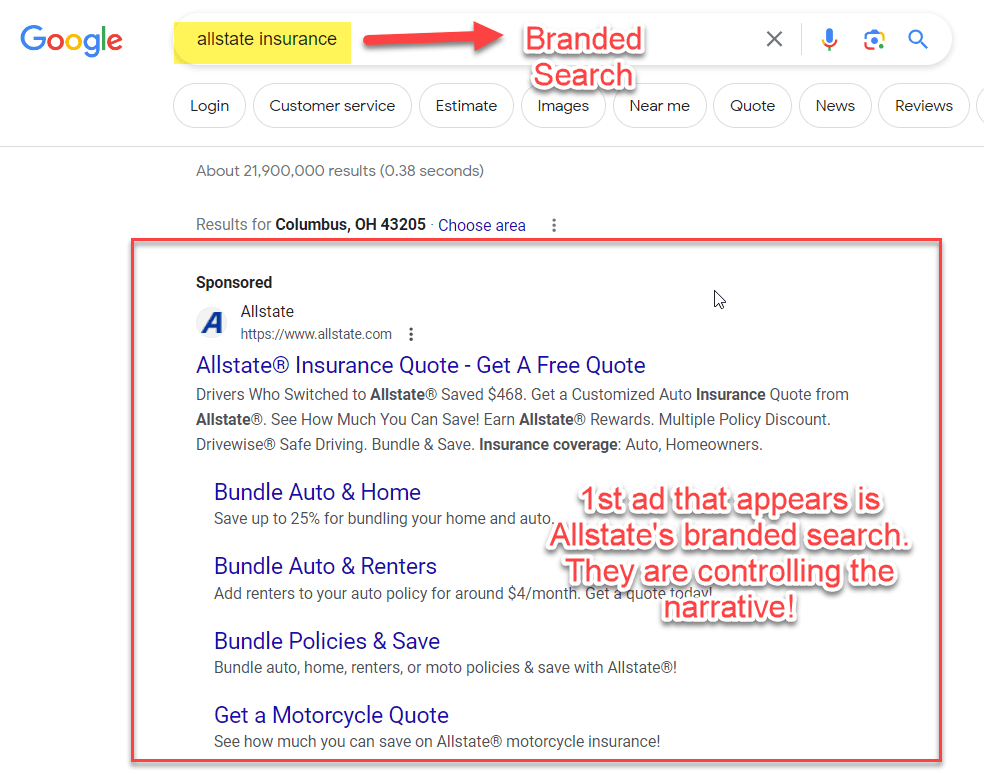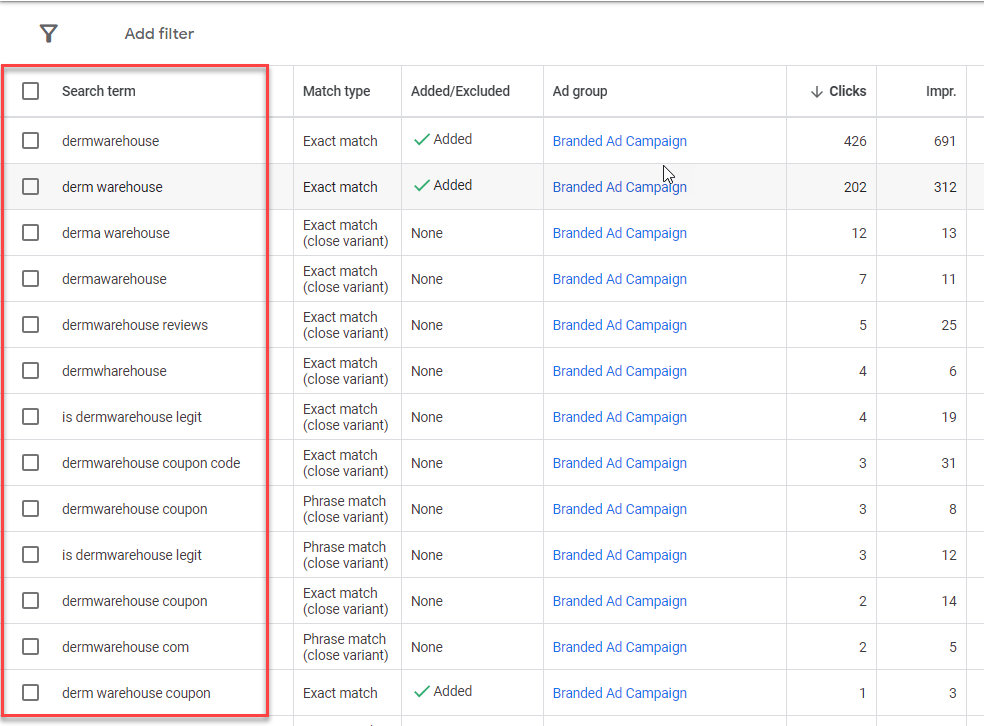Should You Bid on Your Brand Name with PPC Ads?
Bidding on your brand name is a controversial topic. It reminds me of whether you’ll vote Democrat or Republican in the next election. Like politics, people have strong opinions on branded keyword bidding. It’s hard to convince someone to change their mind.
One camp believes you must bid on branded keywords so competitors don’t steal your coveted branded traffic. The opposing group feels strongly that you’d convert on your branded traffic regardless of whether or not the ads are running and you’re wasting money bidding on your brand name.
After reading my list of pros and cons, you can formulate your opinion on incorporating branded ads into your paid advertising strategy.
Need Support? Contact our PPC experts – We manage millions in paid ad spend for small, medium, and large businesses.
What Is A Branded Ad?
A branded advertisement is when you bid on keywords associated with your business via Google PPC to ensure your advertisement populates ahead of competitors.
Below is an example of a branded advertisement for our agency, The Media Captain. You can see other agencies are bidding on our brand name. I’ve taken the stance that I don’t want competitors to populate ahead of me organically or with paid advertisements.
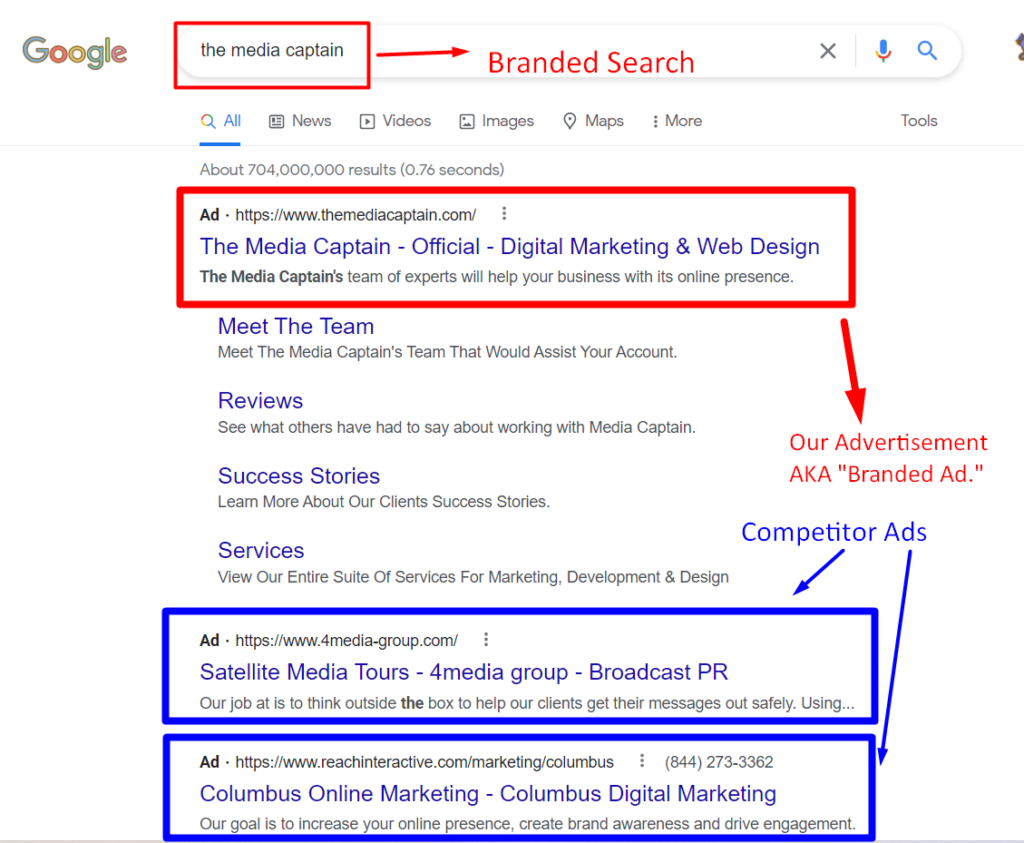
Pros: Bidding on Branded Keywords
Pro: Populate ahead of competitors
When you bid on your brand name, you can ensure that competitors don’t populate ahead of you on Google if you outbid them.
The example below shows that competitors are bidding on Geico’s brand name. Geico isn’t bidding on their brand name. This isn’t a good look for Geico. Someone seeking Geico’s car insurance could be lured into the competitors based on the significant savings they are offering within their ad copy.
In the second example, Allstate bids on their brand name, ensuring people go directly to their site while controlling the narrative with unique ad copy.
GEICO DOES NOT APPEAR FOR THEIR BRANDED SEARCH
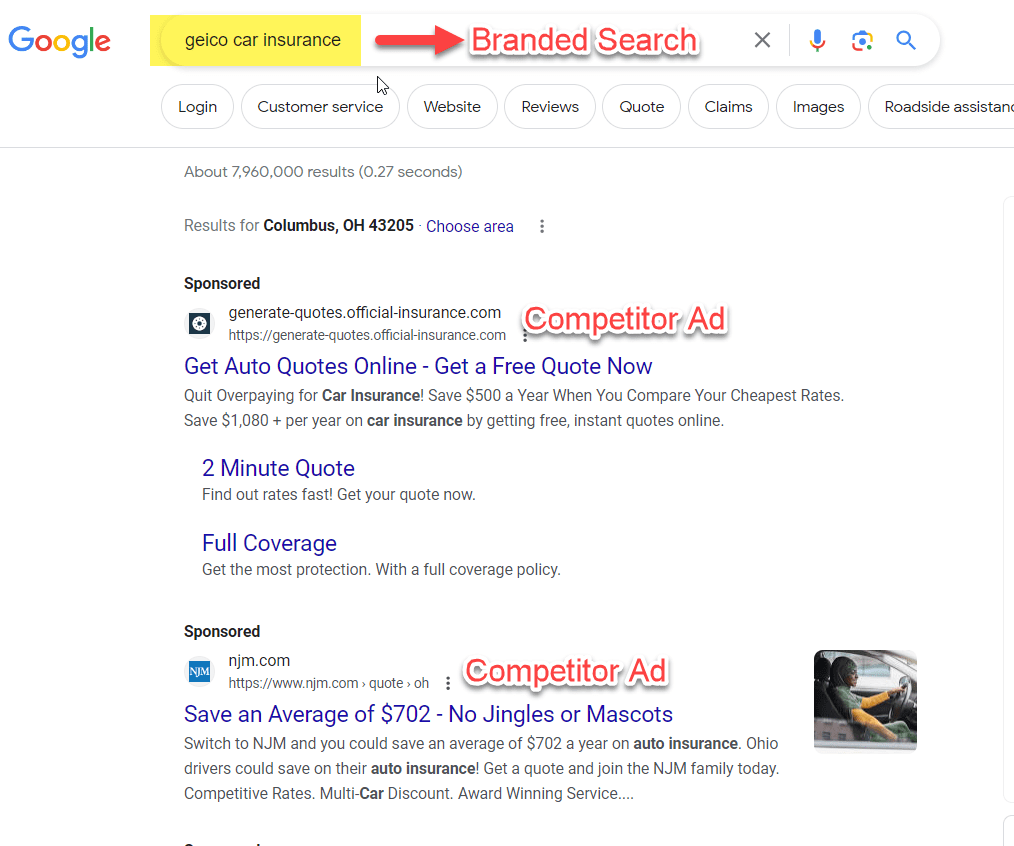
ALLSTATE CONTROLLING THE NARRATIVE WITH THEIR BRANDED AD:
Pro: Control the Messaging
Controlling the narrative doesn’t get talked about enough, but it is one of the best reasons, in my opinion, to bid on your brand name.
You can’t edit organic sitelinks, meaning you’re stuck with what Google pulls from your website for the organic results. Branded advertisements provide you with more flexibility in your messaging based on the ability to adjust the PPC copy.
In the example below, J. Crew promotes a 40% off sale, enticing people to sign up to become a passport member. This is an excellent way for J. Crew to get people excited about a discount through a branded advertisement. Someone may not be aware of the sale if this branded ad wasn’t prominent.
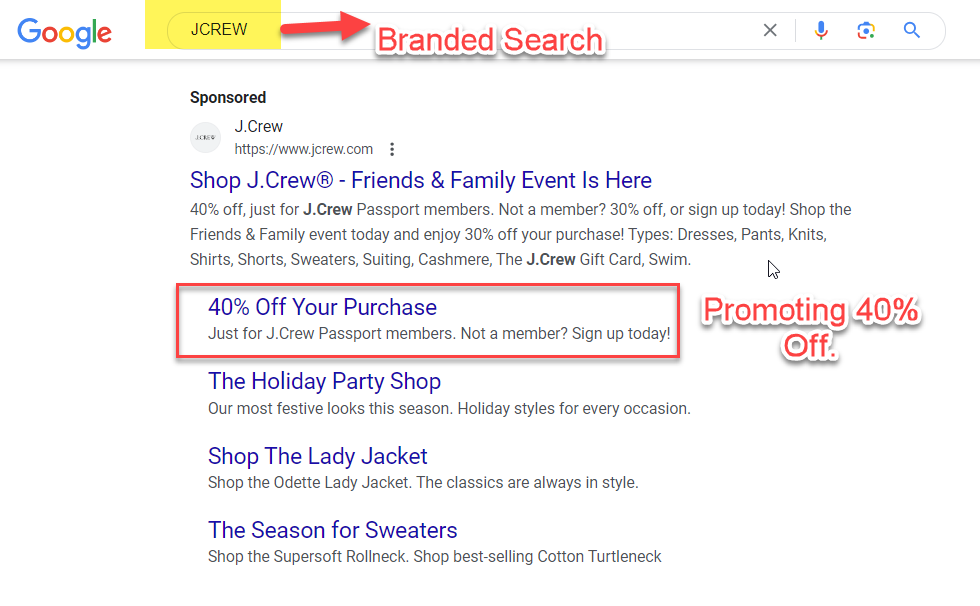 Pro: Relatively low cost per click
Pro: Relatively low cost per click
- Our average cost per click for The Media Captain is $1.15.
- According to WordStream, the average cost per click in Google Ads across all industries is $2.69 for search.
- For most of the keywords we bid on for our marketing agency, the average CPC is north of $10
- The average cost per click for branded keywords is cheaper in most instances than non-branded.
How well-known your brand is will determine how much money you spend on branded searches. The more people type in your brand name, the more clicks you’ll receive. For The Media Captain, we spend approximately $300 monthly on branded ads. For DermWarehouse, our in-house eCommerce brand, we spend roughly $2,000. The reason is that DermWarehouse gets a lot more traffic since we have over 400,000 customers. You can imagine national brands like J. Crew and Allstate spend a good chunk of change on branded ads.
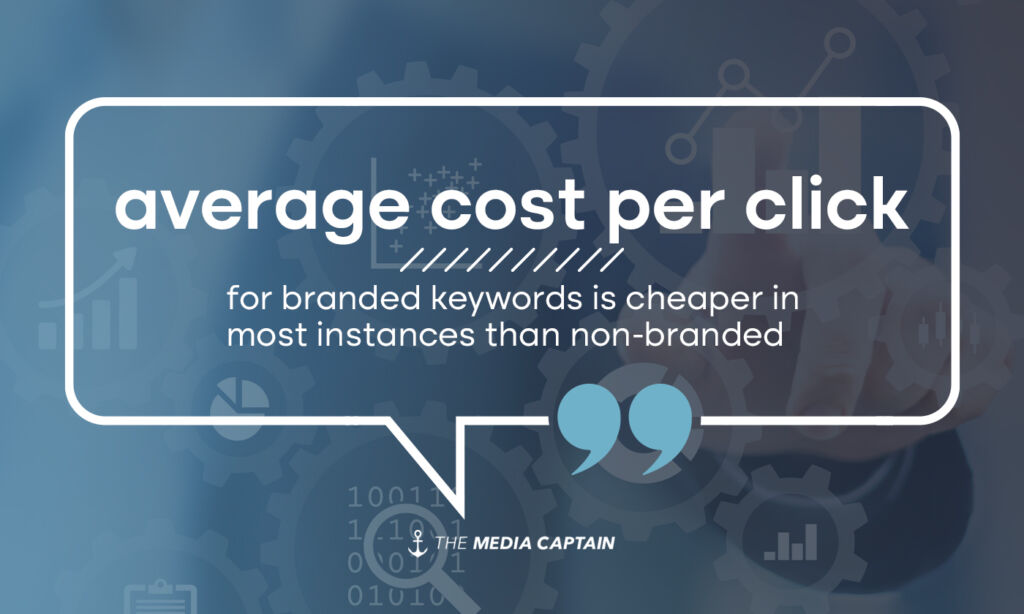
Agency Tip: For The Media Captain and DermWarehouse, we spend less than 10% of our budget on branded PPC campaigns, leaving enough for non-branded search terms. You want most traffic coming to your site to be new potential customers.
Pro: Ability to add negative keywords and search Terms
Not all branded traffic is going to convert for your business. For example, we worked with a plumbing company. A lot of people would search for “The Waterworks Customer Service.” We knew when people were looking for customer service, they weren’t interested in new services; they were existing customers looking for an issue to be resolved. We added “Customer Service” as a negative keyword to better control the traffic for branded search.
Below is the search terms report for DermWarehouse. We noticed many people searched for coupon codes, so we incorporated discounts into our branded messaging. There also saw an interesting trend where people typed “Is DermWarehouse Legit.” Based on this insight, we wrote a blog on this topic so people knew that we were dermatologist-owned and operated.
You gain such valuable insight by looking over your search terms within branded to see how people search for your business. Adding negative keywords can also ensure you get the right branded traffic.
Cons: Bidding on Branded Keywords
Rand Fishkin, a famed marketer, recorded a great video highlighting how your branded search traffic would have likely converted without you having to pay for an advertisement [view here].
Many businesses and agencies don’t bid on brand because they feel it wastes money. I’ll provide you with some of the cons behind bidding on your brand name.
Con: Traffic May have converted without branded ads
When people search for your brand on Google, the intent is high, meaning they are likely to convert.
The branded ad naysayers will tell you that branded ads are just another way for Google to take your money to increase their bottom line.
If someone has already purchased products for DermWarehouse and typed “DermWarehouse” into Google, they will likely convert as they want to repurchase from us. Not bidding on your brand name is a way to save money if you’re confident the traffic will convert regardless.
Related Blog: How much should I spend on advertising?
Misleading Conversion Data
I’ll never forget when I consulted for a large car Insurance company and audited their PPC account in 2012. The entire campaign consisted of branded and retargeting advertisements.
When I asked their current PPC agency why they were only bidding on branded advertisements at the time, the agency told me they were instructed to keep the cost per acquisition under $70. Since car insurance has a high cost per click, they only bid on branded terms and leveraged retargeting to drive a low cost per acquisition.
While this agency was hitting on its “benchmark,” the numbers were misleading. They weren’t converting any net new business. They were driving customer acquisition from existing customers or people already familiar with the brand, which I felt was misleading to the insurance company, especially considering the monthly fee this agency charged.
Many agencies like to incorporate branded advertising into the mix to show a high conversion rate while driving down the cost per acquisition. There’s nothing wrong with bidding on branded ads; our agency does this frequently. It’s essential within your reporting to break down the cost per acquisition for branded versus non-branded, though. This gives you better insight into your performance for net new customers versus customers you likely would have retained even without branded ads.
We also encourage our clients to spend more than 80% of their budget on non-branded keywords to introduce their company to new potential customers. If most of your budget goes towards branded advertisements, you are not getting new traffic and potential customers to your site.
In-Closing
- There’s no right or wrong answer as to whether or not you should bid on your brand name through branded advertisements.
- You can’t stop competitors from bidding on your brand name.
- Branded ads allow your company to appear at the top of Google with strong messaging for a relatively low cost per click.
- The people who click on your branded ads might have converted organically, even if your advertisement wasn’t there.
- Make sure to report on conversion data from branded vs. non-branded.
If you want to discuss your paid advertising or digital marketing strategy, contact The Media Captain today!


